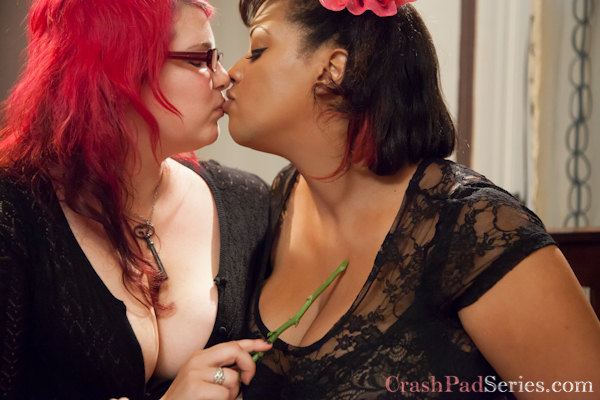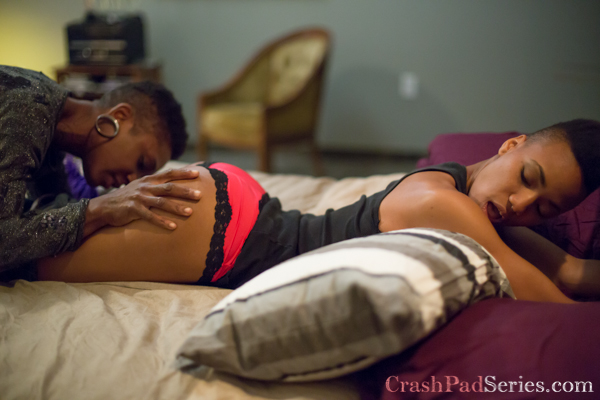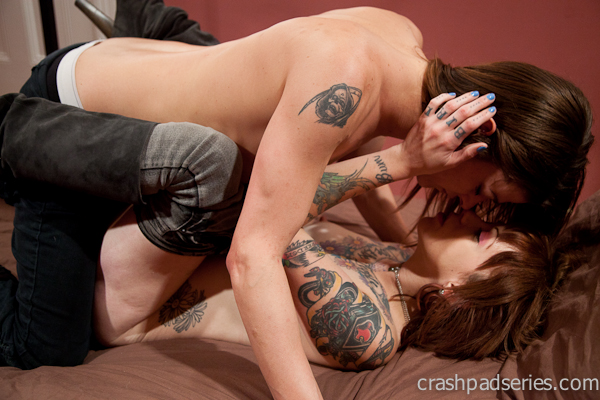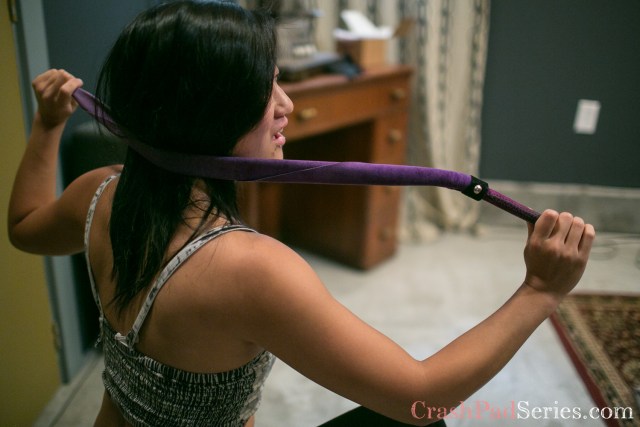Feature image of Erykah Ohms and Tina Horn in Crash Pad Series episode 262. All of the photographs in this NSFW Sunday are from the Crash Pad. The inclusion of a visual here should not be interpreted as an assertion of the model’s gender identity or sexual orientation. If you’re a photographer or model and think your work would be a good fit for NSFW Sunday, please email carolyn at autostraddle dot com.
Welcome to NSFW Sunday!

Betty Blac and Kitty Stryker in Crash Pad Series episode 132
You can practice queer sex witchcraft alone or with a partner, writes Tracey Duncan at Broadly. Here’s how:
“The purpose of sex magic is to harness the energy created during sexual exchanges and focusing it toward a desired result or intention. Those can be whatever you like: Some witches I spoke with used sex magic to alter their appearances, get jobs, and cut cords with negative people. ‘There is an amplified intensity to sexual interaction that is sacred and primal,’ says AJ Durand, a New Orleans–based esoterica teacher. ‘Ritual sex magic can be an open forum of intention and a tool of enlightenment.'”

Odile and Daisy Ducati in Crash Pad Series episode 160
Gestalta is a shibari performance artist. At Broadly, she writes about the different ways to be tied and what it’s like to go from model to rigger:
“Being tied, as opposed to being the one doing the tying, is a very different mentality. What people often don’t realize is that as the person being tied, you have a huge amount of control over the situation. You’ve aware of everything. Whereas the person who’s tying can sometimes feel a little powerless, because you’re having to guess what’s going on in the other person’s body. You have to really listen to the other person and read their reactions and empathize with how they’re feeling, but as you’re not in their body, a lot of it can be guesswork. So the initial, really scary part was guessing what was going on in the other person’s head.”

Chocolate Chip and Nikki Darling in Crash Pad Series episode 152
Nudism can be one way to learn body positivity.
It’s probably fine to sleep with your ex, says science.
Here’s how to get rid of ingrown hairs.
Here are some dating apps that aren’t Tinder.
Not all breakups are romantic. Here’s how to break up with a friend.

Kimberly Kills and Sparky Sin Claire in Crash Pad episode 101
That feeling when you’re dating and you’re really into someone but she’s just not into you? That’s called an asymmetrically committed relationship, according to researchers:
“According to their findings, people with increased odds of being just not that into you, scientifically speaking, tend to perceive themselves as having more potential alternative partners, or a sort of “plenty of fish” mentality. They are also likely to be attachment avoidant, with a higher number of prior relationship partners and a history of cheating in their current relationship. (So, a lot of the traits you’d probably expect.) Additionally, people with divorced parents aren’t any more likely to be less committed, but people whose parents never married are.”

Cosmic and Miss Yum in Crash Pad Series episode 246
Eventually, you’ll get over your ex. Build a support system, journal, remember that feelings aren’t facts, take a Tylenol, give it three months, and focus on how you’re growing:
“The story of your relationship is over, so you can’t rewrite it. Instead, try to focus on the fact that you will grow from this experience. Just because it’s over for your relationship doesn’t mean it was a waste of time. ‘Grief does shape us in big ways, says Lodro Rinzler.”
And if you find yourself fixated, try to consciously redirect your thoughts.

Bhuma Belle and Tinder in Crash Pad episode 170
Here’s why people in relationships sometimes have their own private languages:
“Regardless of the form they take, these languages help build intimacy in relationships. It seems people intuitively understand this: When a friend of mine met my partner, she told me he seemed like a keeper, in part because of our shared language. “Couples create ‘rituals of connection’ to keep their ‘culture of two’ strong, private language being one type of those rituals,” says Carol Bruess, director of family studies at the University of St. Thomas in Minnesota. “When couples have their own language rituals … they feel like they know one another in a way that others don’t, and that they have a strong connection or bond to each other. They have their own little private world.” A 1993 study by Bruess and her colleague Judy C. Pearson in the Journal of Social and Personal Relationships found that couples in happier marriages used more private language.”



Problem with that article dating app not tinder, the last app included was tinder, but the bigger problem is some of those apps are iOS only so no android or web version. Plus two of the apps I so far tested(on my Android phone) are a really binary, as one is essentially forced to choose either male or female, which for me is a big no as nb trans person.